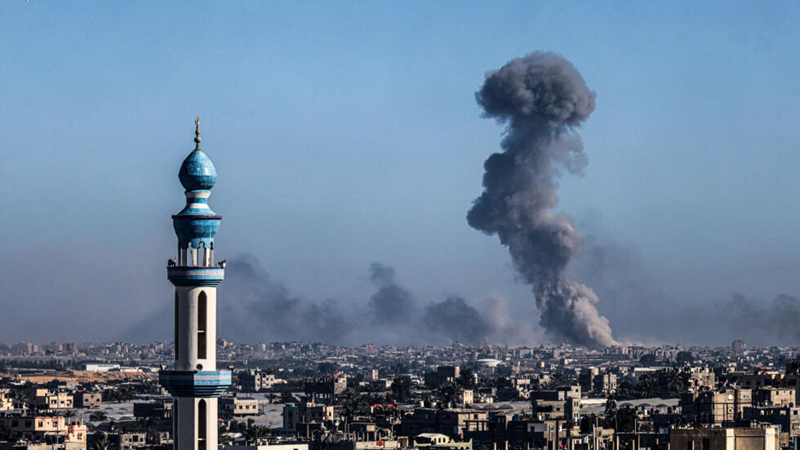Hamas warns Israel a Rafah invasion will threaten hostage talks

“Any attack by the occupation army on the city of Rafah would undermine the exchange negotiations,” a leader in the Palestinian militant group told AFP as Benjamin Netanyahu vowed to extend operations. The Israeli prime minister this week said he had told troops to prepare to go into the city, as part of its aim to destroy Hamas for mounting the deadly attacks on southern Israel. But he has faced growing calls not to attack Rafah, on the border with Egypt, the last refuge for Gazans fleeing Israel’s relentless bombardment elsewhere in the coastal territory. Foreign governments, including Israel’s main ally the United States, and humanitarian aid groups have voiced deep concern about the impact on displaced civilians. Some 1.4 million people — about half of Gaza’s total population — have crowded into Rafah, with many living outside or in tents and where food, water and medical supplies are increasingly scarce.
In an interview to be aired on Sunday, Netanyahu told US broadcaster ABC News that those who urged Israel not to go in to Rafah were effectively giving Hamas licence to remain. According to published extracts, Netanyahu said the Rafah operation would go ahead “while providing safe passage for the civilian population so they can leave”.
Hamas seized some 250 hostages on October 7, according to an AFP tally based on official Israeli figures. Israel says 132 are still in Gaza but 29 are thought to be dead. Renewed talks for a pause in the fighting have been held in Cairo, with Hamas open to a ceasefire, including a possible exchange of hostages for women and children held in Israeli prisons.
Israeli strikes have long hit targets in Rafah, and combat on Sunday seemed intense several kilometres (miles) to the north in Khan Yunis city, where AFP correspondents heard regular explosions and saw plumes of black smoke. Israel’s military said troops were conducting “targeted raids” in the west of Khan Yunis, an area where Hamas’s armed wing reported violent clashes. The Hamas-run territory’s health ministry on Sunday reported 112 deaths over the previous 24 hours, and Hamas authorities added there had been dozens of air strikes, including on Rafah. Vowing to eliminate Hamas, Israel has responded with a relentless offensive in Gaza that the territory’s health ministry says has killed at least 28,176 people, mostly women and children.
‘No place to escape’
The United Arab Emirates, Qatar, Oman and the Organisation of Islamic Cooperation became the latest to raise alarm over the plan for Rafah, Gaza’s last major population centre that Israeli troops have yet to enter. “The OIC strongly warned that the continuation and expansion of the Israeli military aggression is part of rejected attempts to forcibly expel the Palestinian people from their land,” the 57-nation Jeddah-based bloc said on social media platform X. It stressed “that such acts fall under genocide and would lead to a humanitarian catastrophe and collective massacre”. Saudi Arabia and the United Arab Emirates have also rejected “forced” displacement of people from Rafah. The notion evokes memories in the Arab world of the mass exodus or forced displacement of Palestinians around the time of Israel’s creation in 1948. Earlier in the Gaza war Israel’s military published maps which it said enabled residents to evacuate areas “for their safety”.
But Gazans, driven further and further south, have repeatedly said they can find no safe refuge from the fighting and bombing. Farah Muhammad, 39, a mother of five displaced from northern Gaza, was at a loss to know what to do if troops move in to Rafah. “There is no place to escape,” she said. German Foreign Minister Annalena Baerbock wrote on X that “the people in Gaza cannot disappear into thin air”. Saudi Arabia called for an urgent UN Security Council meeting, while Britain’s Foreign Secretary David Cameron said the priority “must be an immediate pause in the fighting to get aid in and hostages out”.
Washington, Israel’s main ally and military backer, has also warned that, if not properly planned, sending troops into Rafah risks “disaster”. Netanyahu, whose coalition government includes far-right ministers, faces calls for early elections and mounting protests over his failure to bring home the hostages. “It’s clear Netanyahu is dragging out the war. He has no idea what to do on the day after,” one protester, Gil Gordon, said in Tel Aviv. “We know the people are with us, but we don’t feel the government is,” said Efrat Machikwa, a niece of captive Gadi Mozes. Some Israelis interviewed by AFP in Tel Aviv expressed doubt that pushing into Rafah will help the captives. “The army makes pressure, but unfortunately this doesn’t bring the hostages back alive,” said Einav Peretz, 34.
UN agency accused again
In Gaza City, an AFP photographer embedded with Israeli troops filmed inside a tunnel under a compound of the UN agency for Palestinian refugees UNRWA. The army and the Shin Bet security agency said the underground facility “served as a significant asset of Hamas’s military intelligence”.
Leave a Comment